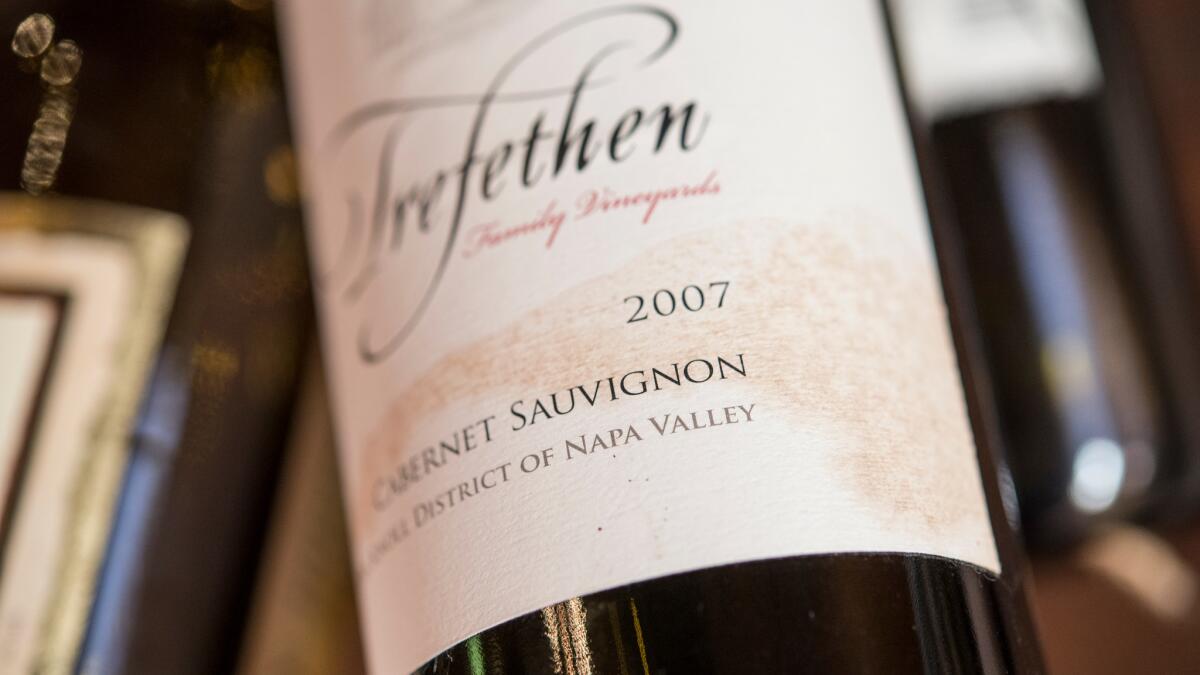How can a wine made in Georgia be labeled ‘Napa Valley’?

A California-led proposal to tighten wine-labeling rules has rallied the state’s lawmakers, split the industry and spurred a debate that shows no signs of resolution.
Flexing political muscles, 48 members of the House of Representatives, including three dozen Californians, are seeking tighter labeling rules to protect the value of names like “Napa Valley.” Opponents fear the consequences, with one Texas winemaker warning that the new rules would prove a “devastating blow.”
On Thursday, at the request of the Wine Institute and the California Assn. of Winegrape Growers, federal regulators extended a public comment period that’s already proved to be revealing despite some distractions within the industry.
“Their members are currently preoccupied with the grape harvest,” the Treasury Department’s Alcohol and Tobacco Tax and Trade Bureau noted in explaining the extension.
Winemakers, oenophiles and others now have until Dec. 7 to opine on the new labeling rules proposed in June. The rules would further restrict how out-of-state producers can use viticultural areas on their labels.
So far, the 65 comments posted reflect diverse views that aren’t always determined by geography.
Concerns raised by Texas winemaker Kert Platner, for instance, were echoed by Lodi, Calif., winemaker Dave Pechan, who called the rule changes “absolutely unworkable.” The California Assn. of Winegrape Growers, requesting more time to study the proposal, warned of lost grape sales.
“Tread carefully when proposed regulations may disrupt long-established commercial relationships,” the association’s president, John Aguirre, wrote Aug. 19.
On the flip side, lawmakers from New York and Oregon joined the California House members in urging regulators to act soon.
“A final regulation is needed [to] protect consumers from deceptive labeling practices as well as the integrity of American viticultural areas,” the Congressional Wine Caucus members wrote Aug. 19.
The label rules in question govern appellation of origin and certain other identifying words. An appellation of origin is a designated and distinctive region, such as the 22,400-acre Edna Valley American Viticultural Area in San Luis Obispo County or the 2.6 million-acre Sierra Foothills Viticultural Area.
Federal rules require that at least 85% of a wine whose label includes a viticultural area be derived from grapes grown within the designated region. The wine must also be fully produced within the state.
A loophole, though, exempts wines that are sold strictly within single states rather than being placed into interstate commerce. A wine made in Georgia with Napa Valley grapes, for instance, has been labeled as “Napa Valley,” according to U.S. Rep. Mike Thompson (D-St. Helena).
The rule proposed in June would extend the general interstate labeling requirements to wines sold within single states. In their Aug. 19 letter, the wine caucus members urged regulators to “quickly finalize” the rule to ensure labels are “accurate and truthful.”
“As an aspiring boutique winemaker, the thought of others, especially ultra-large wineries from out of the area, being able to capitalize on a region without actually being there is fraud in my eyes,” Napa resident Garett Savage wrote.
From New York City, though, the Brooklyn Chamber of Commerce cautioned that the tighter rules would have “unintended negative effects” on small urban winemakers. The conservative, Sacramento-based Pacific Legal Foundation warned the label restrictions raise “serious 1st Amendment concerns.”
There are a “complex set of considerations” at play for the California grape growers who sell to out-of-state producers, Wine Institute President Robert Koch acknowledged in asking for more time to review the proposal,
Doyle writes for the McClatchy Washington Bureau.
More to Read
Inside the business of entertainment
The Wide Shot brings you news, analysis and insights on everything from streaming wars to production — and what it all means for the future.
You may occasionally receive promotional content from the Los Angeles Times.










